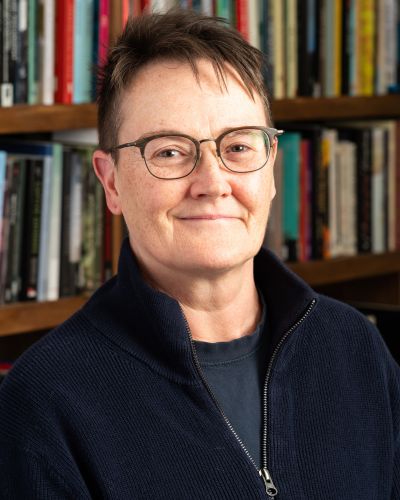Meet New Faculty Member Kim Q. Hall
26 August 2024

Professor Kim Q. Hall
Kim Q. Hall (she/they) recently joined the Department of Philosophy as a Professor of Philosophy. We caught up with Professor Hall and asked about their work and interests.
What inspired you to enter this field?
I grew up in a one-stoplight town in the rural U.S. south where most people did not go to university. My father had a pharmacy degree, and I was the second person on my father’s side of the family and the first person on my mother’s side of the family to go to university. Growing up, I learned that there were only three reasons to go to university: to become a medical doctor, to become a lawyer, or to go into business. So I began my undergraduate studies as a pre-med student. I had internalized the view that a university education was something one went through on the way to a job in those fields. While I loved my ecology class, it really wasn’t until I took a philosophy class that I began to feel the value my education and appreciate its importance for understanding my life, relationships with others, and nature of the world. Reading Simone de Beauvoir’s The Second Sex and Angela Davis’s Women, Race, and Class inspired me to change my major from pre-med to philosophy. They asked questions about oppression and privilege that helped me put words to various forms of injustice I had both experienced and witnessed. I began to read beyond what was assigned on my course syllabi. I became a philosophy major and decided to pursue a Ph.D. in philosophy because I wanted to understand how injustice is perpetuated in beliefs, values, and practices that are taken for granted and normalized. Studying philosophy inspired me to learn and think more about the connections between the questions we ask and the possibilities for social and political change.
What can you tell us about your professional background and what you have enjoyed most about your career so far?
I earned a B.A. in Philosophy at Randolph-Macon College in Ashland, Virginia, where I was also the first student to graduate with a certificate in what was then called Women’s Studies. I earned an M.A. and Ph.D. in Philosophy at State University of New York (SUNY) at Binghamton. Prior to coming to the University of Alberta, I was Professor of Philosophy and a faculty affiliate in the Gender, Women’s, and Sexuality Studies and Appalachian Studies programs at Appalachian State University, where I also served as Humanities Council Coordinator (2012-2014) and Director of the Gender, Women’s, and Sexuality Studies Program (2014-2017). Throughout my career, I have been interested in efforts to enhance equity, diversity, and inclusiveness in the profession. For example, I have served as Co-Chair of the Advisory Board for Philosophy in an Inclusive (PIKSI) Key and as an inaugural member of the Society for Phenomenology and Existential Philosophy (SPEP) Committee on Accessibility, Disability, and Inclusion. I am excited to join the University of Alberta’s Department of Philosophy as Professor of Philosophy and to serve as Interim Director of the Institute for Intersectionality Studies. If I had to choose one thing that I have enjoyed about my career so far, it’s the opportunity to continue to learn and think with others about matters of importance in our lives and world.
What can you tell us about your research?
Broadly speaking, my research forges connections between feminist philosophy, critical disability studies, queer theory, critical philosophy of race, and the environmental humanities to address issues of identity, embodiment, and normalization. In my work I seek to develop a queer crip feminist approach to how power shapes historically and culturally contingent norms of identity and embodiment in ways that determine both experiences of oppression and strategies of resistance. My thinking in these areas has led to projects concerning gender, race, sexuality, disability, the nonhuman natural world, food, sustainability, and norms of human embodiment.
What’s your personal teaching philosophy?
In my teaching I strive to not only include perspectives from marginalized groups but also consider how those perspectives speak back to canonical assumptions and suggest ways of doing philosophy, gender, disability, and queer studies otherwise. I think of teaching as an invitation for students to think with me about questions and problems discussed in class materials. This means that I don’t understand my role as providing settled answers to questions. Instead, I try to help students appreciate the importance of the question itself, how asking the right question is often as or even more important than answering it. Questions orient us toward what we think is important, leading us down one path rather than another. What questions does the author want to answer and why? What questions did the author not consider? What would happen if they considered them?
What are your interests/hobbies outside of work?
I enjoy cooking, reading, and travelling. And I am a fountain pen enthusiast.